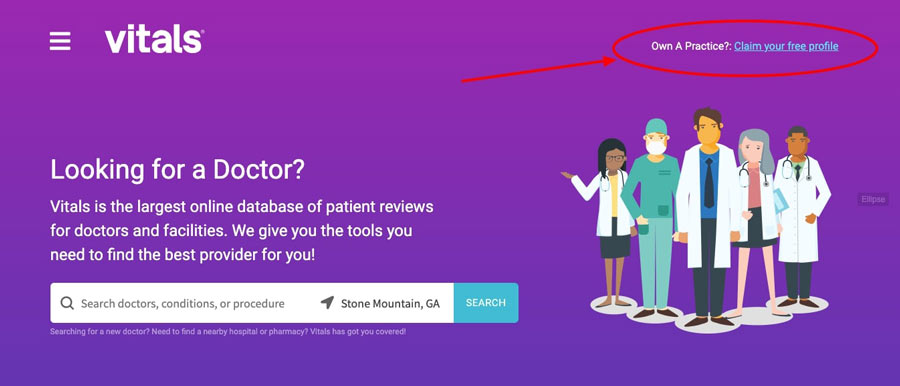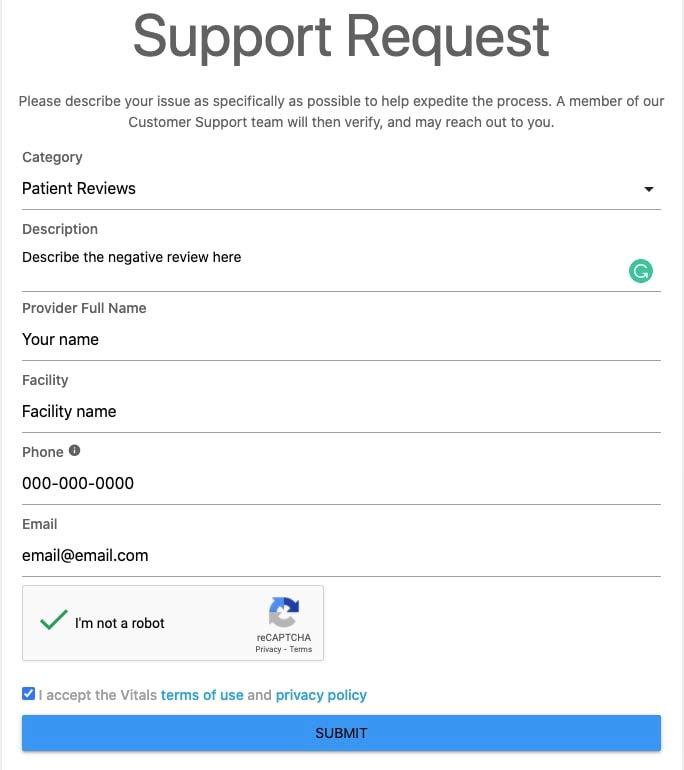
How to Remove Negative & Fake Reviews From Vitals.com
This page has been peer-reviewed, fact-checked, and edited by qualified attorneys to ensure substantive accuracy and coverage.
For doctors and healthcare providers, a fake Vitals review can have devastating consequences for your practice. Unfortunately, the question of how to remove a Vitals review does not have a simple answer. Vitals does not allow for much input from or interaction by the doctors being reviewed.
To effectively address and remove a negative or fake review on Vitals.com, we recommend taking one or more of the following actions:
- Reach out to the reviewer privately and request its removal,
- Report the review to Vitals using the ‘Support Request’ form,
- Use online reputation management strategies to suppress the review in internet search results, and/or
- Work with an experienced internet attorney to pursue appropriate legal action against the reviewer and other remedies.
At Minc Law, we have seen many medical professionals deal with harmful reviews. Some of them are even fake, posted by an individual that was never even a patient but simply had a personal grudge. Navigating reviews as a physician can quickly become ethically and legally perilous. It is essential to hire an attorney who can take HIPAA confidentiality issues into account when developing a comprehensive response strategy.
In this article, we discuss the impact of negative Vitals reviews and what you can do to respond to them. We also list helpful techniques for spotting fake reviews and minimizing the chances of receiving negative reviews from actual real patients.
Let us help you explore your legal options and craft an effective strategy.Fake reviews harming your business?
Reasons to Remove a Negative Review From Vitals.com
There are many reasons why a healthcare provider, medical professional, or doctor might want to consider removing a negative review from Vitals. Negative reviews can affect your medical professoinal reputation online, your incoming customers, and even your website’s ranking in internet search results.
Below, we address the reasons why a bad Vitals review may affect you and your practice.
Why Would You Want to Get a Vitals.com Review Removed?
As the world becomes more reliant on the internet, the importance of online reviews cannot be overstated.
According to one 2020 Software Advice survey, 71% of prospective patients use online reviews to find a new doctor. A 2022 survey by Brightlocal also found that for 82% of consumers, reviews play an “important” or “very important” role in choosing a healthcare provider.
For physicians, it is not only crucial to have a positive online reputation in general but to have a positive presence on Vitals (and other popular healthcare review marketplaces) specifically.
Vitals.com is a Popular Healthcare Website & Physician Directory
Vitals is one of the top physician review sites in use today (alongside Healthgrades, ZocDoc, and RealSelf). Claiming a profile on sites like these helps healthcare providers stay on top of their online reputation.
Vitals has previously been named one of the best doctor websites and best health review websites by Kiplinger Magazine in 2011 and CNN Money in 2010. At the time of writing, Vitals.com is listed in the top ten physician review websites to monitor by HelloHealth and OpenMD.
And the website’s meteoric rise and popularity make sense. Vitals does more than list patient reviews about various healthcare providers. It also provides content and tools for patients to prepare for upcoming consultations and book appointments directly from the platform.
Potential Effects of Negative Vitals.com Review on Your Medical Practice
In the era of extreme reliance on internet research to make purchase decisions, healthcare providers are no less immune to reviews than any other business. In fact, online reviews factor into the healthcare choices of 9 out of 10 patients.
And since online reviews contribute so highly to consumer decisions, negative reviews could do serious harm to your practice. Even if every doctor and employee in your practice prioritizes customer service and high-quality care, enough negative reviews can generate the same negative consequences as a practice with low-quality customer experiences.
Such consequences can include:
- Cancellations of existing appointments,
- More no-shows/no-calls,
- Lower foot traffic and decreased patients,
- Long-term patients choosing another provider,
- Negative press and PR,
- Worsened public reputation of your medical practice,
- Increased negative reviews,
- Decreased revenue, and even
- Bankruptcy.
Minc Law Negative Review Tip: Reviews are extremely influential in today’s online world. There are many consequences—both positive and negative—of reviews across various platforms. For more information about how online reviews can impact your personal and business reputation, see our article, Importance of Online Reviews: 50+ Key Statistics.
How Much Control Do You Have Over Your Vitals.com Listing?
It is Vitals.com’s goal to list every actively licensed physician in the United States—with or without that physician’s permission. According to the Vitals website:
“Vitals.com lists all actively licensed physicians in the United States. The information that we compile is a matter of public record on both state and national levels. The collection and distribution of this data do not require the permission or participation of the listed party. We are unable to preferentially remove or suppress entries on the request and physicians may not decline listing with our service.”
However, doctors and healthcare professionals do have the ability to claim their Vitals.com profile. Claiming your Vitals profile enables you to (at least) add accurate contact information and a professional photo(s) to the platform.
To claim your profile, simply visit the Vitals homepage and click the link at the top right corner.

Next, fill in your email, full name, company, and phone number. Click Claim Profile to submit your request.

Once your Vitals profile has been claimed, you will be able to add or update a photo and complete other data elements about your practice.
We recommend claiming your profile on healthcare review sites like Vitals and Healthgrades if you have not already done so. Properly managing your profiles on these platforms enables you to optimize your reputation review management, improve your search engine optimization (SEO), and generate new leads for your business.
Claiming your profile as soon as possible can also protect against scammers or malicious actors claiming your profile on your behalf. If a third party claims your profile before you do, we recommend reaching out to Vitals through their support request form.
Are Vitals Reviews Anonymous?
Much like most review platforms, patients have the option to leave a personalized review—but reviewers can also post anonymously if they wish.
While the platform does claim to filter out unconstructive reviews, the anonymity available to reviewers still opens the doors to abusive, fake, and excessively negative comments.
Responding to Patient Reviews on Vitals.com
Receiving a negative review from a patient on any platform is understandably distressing. Your first reaction may be to reply to the review and defend your good name (and the reputation of your practice)—but there are two problems with this response.
First, keep in mind that you may not be able to respond to a Vitals review at all.
Second, even if you can (or could) respond to a Vitals review, replying to an online review on any platform may not be appropriate. We discuss both issues in greater detail below.
Can You Respond to Reviews on Vitals?
While it is true that healthcare providers generally dislike most review platforms, there is even more reason in the case of Vitals. The platform disabled the ability for providers to respond to reviews several years ago.
Since this change, Vitals.com has frequently been criticized for providing no means of access for doctors and healthcare providers to respond to patients.
Contacting the Reviewer Offline to Resolve the Issue
Even in cases where you can respond to a review, we generally recommend against medical reviewers replying on the same review site where it was posted.
First, replying to the review publicly risks drawing more attention to the negative feedback and could potentially trigger the Streisand Effect.
Second, replying may even incentivize other readers to pile on and add their own negative reviews. Responding to inflammatory language with anger or defensiveness can also cause the reviewer to become even angrier and escalate the situation—all in public.
Third, beyond questions of unintentionally drawing attention to the situation, you may risk violating the Health Insurance Portability and Accountability Act of 1996 (HIPAA) and patient confidentiality rules. Medical providers should be extra careful not to reveal personal or medical information about the reviewer, such as:
- Referring to the reviewer by name (even if they used their name in their review),
- Confirming that the patient did visit your office, or
- Explaining any medical conditions or treatments involved in the office visit.
As you can see, defending yourself without revealing facts about the patient or their visit can be an ethical minefield. In most cases, we recommend responding to bad reviews by taking the conversation offline. If you know the identity of the patient, reach out to them via phone, email, or private message to try to resolve the situation privately.
Make sure to read our comprehensive guide explaining how medical professionals can respond to reviews with HIPAA and other confidentiality considerations in mind.
How to Remove a Review From Vitals.com
As previously mentioned, there are very few avenues of response for doctors who receive negative or fake doctor reviews on Vitals. The best course of action – if the reviewer is a real patient – is to reach out to them privately and resolve the situation, and request that they take down the review themselves.
Video: How Medical Professionals Can Remove Negative Patient Reviews

But if working with the reviewer is not an option, you may need to report the review, use online reputation management strategies, or even pursue legal action. We address each option below.
How Do You Submit a Request to Remove a Negative Review From Vitals?
Several years ago, Vitals discontinued their “report abuse” function. Now, if healthcare providers wish to report a review to the platform, they must use the generic ‘Support Request’ form.

However, it is unclear how effective even submitting this support request form can be for removing fake or negative Vitals reviews. Healthcare providers are at the mercy of the Customer Support team, who review each request.
What Factors Does Vitals.com Consider When Evaluating a Review Removal Request?
Vitals uses a five-star rating framework based on factors such as diagnostics, promptness, staff, appointment availability, and overall rating. The platform claims that user reviews are systematically screened for defamatory and inflammatory remarks.
According to Vitals’s Terms of Use, submissions and reviews must be true and original, and reviewers cannot be impersonating anyone else. Vitals submissions also must not be:
- Defamatory,
- An invasion of privacy,
- Threatening,
- Harassing,
- Vulgar or obscene,
- Infringing on the rights of others,
- Attacking an individual personally, or
- Promoting violence or illegal activity.
Vitals may consider removing outdated physician and healthcare profiles that are still published after a practice closes its doors or physician and/or healthcare professionals retire.
What Can You Do to Resolve the Issue If Vitals.com Refuses to Delete a Negative Review?
Since reporting and flagging reviews is not an option for physicians and healthcare professionals, it may become necessary to work with an experienced internet attorney to help you remove negative and fake Vitals reviews.
At Minc Law, when a client comes tackling negative Vitals reviews, every situation is unique and should be approached with a well-crafted, tailored response. In most cases, removal may be achieved by outreach, suppression, or litigation.
Option #1: Reach Out to the Reviewer
As emphasized above, the most straightforward solution is often to contact the writer of the negative review and request its removal. In many cases, the problem stems from an unsatisfactory patient experience. If the healthcare provider can follow up with some positive customer service, the situation may be resolved.
However, not every negative review can be handled by customer outreach. Some reviewers may not be willing to work with you in good faith.
For example, if a reviewer was never a patient at all—perhaps they may be an aggrieved ex-employee or an individual with a personal vendetta against you. In this situation, reaching out to them is less likely to resolve the issue since their primary goal is often to damage your business’s reputation among potential patients and the public at large.
Option #2: Utilize Online Reputation Management Services
Another option is to focus on cultivating or suppressing other internet content about your practice besides that negative review. After all, your online reputation is cumulative, based on the loudest and most consistently high-ranking voices.
Instead of trying to have a negative Vitals review removed, it may be best to use online reputation management (ORM) to boost positive content about you and/or your practice. ORM strategy combines SEO, marketing, and public relations tactics to create positive content, suppress negative reviews and other content, and bolster a positive reputation online.
ORM can be used to influence the kinds of content that appear on an internet search of your name or your practice’s name. Instead of that negative Vitals review, your overwhelming number of positive reviews and other positive, branded content will appear at the top of search results.
Option #3: Take Legal Action Against the Reviewer
In other cases, you may need to file a defamation lawsuit and obtain a court order to remove the content.
Not every review rises to the level of defamation, of course. To be considered defamation, the review must contain a false statement of fact (i.e., not opinion) about you or your practice that does harm to your reputation.
If the review does rise to the level of defamation, you may be able to file a defamation lawsuit. Anonymous reviewers may be “unmasked” by filing a John Doe lawsuit, which includes a discovery process consisting of subpoenas to the platform in question to produce identifying information about the reviewer. Then, post-identification, you may amend your defamation complaint and continue to pursue litigation against them.
Minc Law Tip: Keep in mind that generally, you cannot sue Vitals for negative or fake reviews posted by third-party users, since like other third-party platforms, Vitals is protected by Section 230 of the Communications Decency Act. This landmark piece of legislation grants near blanket protection from harmful content posted on their sites. Therefore, it is almost always more advisable to pursue legal action against the individual who posted the harmful content. For more information, check out our article, Can I Sue Google?
What is the Best Way to Deal With a Negative Vitals.com Review?
Unfortunately, there is no “best” way to deal with a negative doctor review on Vitals. The platform itself has no straightforward process for responding to, flagging, or reporting reviews. You can deal with negative Vitals reviews by filling out the general inquiry form, but whether you hear back from the Customer Support team depends on if they agree with your concerns and decide to take action.
Every situation is unique, which is why it is a good idea to consult an experienced internet attorney to help you analyze your case, consider possible outcomes, and craft the best strategy for your practice.
Other Considerations When Dealing With Negative Reviews on Vitals
Below, we explore strategies for identifying fraudulent reviews as well as reducing the risk of negative reviews from real patients. Then, we discuss when and why to hire an internet reputation lawyer to help you handle harmful Vitals reviews.
How to Spot Fake Reviews on Vitals.com
There are many reasons that you may be hit with a fake review. Perhaps a disgruntled ex-employee, a competitor, or even a personal acquaintance may wish to damage your professional reputation by making up negative stories about a fake experience in your office.
These fraudulent reviews are often difficult to distinguish from negative reviews left by real patients. But there are a few techniques you can use to spot fake reviews, including:
- Check your business records. Does the reviewer’s name or described experience match a patient or complaint in your files? If not, the review may be fraudulent.
- Analyze the language. Is the review riddled with grammatical errors? Does the content of the review inaccurately describe your services? Or does the review promote a competitor of yours? Any of these characteristics could be a sign that the review is fake.
How Do You Reduce the Risk of a Negative Review on Vitals.com?
The best way to ensure positive reviews is to provide stellar customer service. But most patients do not rank their doctors using the same criteria that they use for other businesses, which makes it difficult to know what it takes to satisfy a patient.
The good news is that while every patient is different, the American Academy of Family Physicians found the following common contributing factors in patient satisfaction:
- Clarify expectations from the beginning—Make sure everyone is on the same page about the patient’s needs and wants.
- Positive communication—Take your patient’s problems seriously and genuinely listen to them during their visit.
- Shared decision-making—Allow patients to have some control over their visit with you. Let them share their ideas and concerns.
- Time spent speaking—Avoid the common trap of making patients wait a long time, only for you to spend about five minutes with them.
- Physician’s appearance—Like it or not, what you wear matters. If you can, opt for semi-formal outfits over a standard white lab coat or a more casual dress.
If you have loyal and happy patients, be sure to ask them to leave a review on popular review sites and places like Google. The more positive reviews you have to bolster your online presence, the less of an impact a single negative review will make.
Minc Law Tip: When attempting to assess patient needs, consider your practice as a whole. Many patients consider the cleanliness of the building, the attitude of the receptionist, or even what was on television in the waiting room when leaving reviews. Ensure every employee who answers phones or interacts with patients understands how to make a positive and compassionate impression.
When Should You Hire an Internet Reputation Lawyer to Help Remove Reviews From Vitals.com
Handling an anonymous negative review—especially a fake one—can quickly become very complicated. For example, it may not be worth it to pursue litigation if the review is not causing significant damage to your practice and is only one of many (mostly positive) reviews.
But it may be time to hire an experienced internet attorney and pursue legal action if:
- A single user appears to be leaving multiple fake reviews;
- The harmful review is anonymous and you are struggling to identify the reviewer; or
- The allegations in the review are serious enough to harm your personal or professional reputation (such as malpractice, criminal activity, sexual harassment, or discrimination).
Work With Us to Remove Negative Patient Reviews From Vitals
An experienced internet defamation lawyer can help you decide how best to respond to a negative review from Vitals—such as reaching out to the reviewer, obtaining a court order to remove content, or investing in ORM services.
If your medical practice has been the victim of negative, fake, or malicious reviews on Vitals, we can help you. Our legal team at Minc Law has the experience you need to navigate HIPAA requirements, review the platform’s Terms of Service, and identify and unmask anonymous reviewers.
★★★★★
“Attorney Dorrian Horsey handled a very sensitive, embarrassing case for me and she did so with kindness, grace, and without judgement. She was fiercely dedicated the whole year it took and did not waiver. She has changed and, in fact, saved my life. Any client or firm should feel honored to have her on their team. Dorrian deserves, a promotion, a raise, a company car, three weeks paid vacation, and a corner window office when we return to offices. Words cannot fully express how thankful I am to Attorney Horsey. Thank you, Dorrian!”
LS
Oct 27, 2021
To schedule your free, initial no-obligation defamation consultation with an intake specialist, call us at (216) 373-7706 or fill out our contact form online.
Video: Online Medical Review Removal Client Testimonial – Dr. Davis






